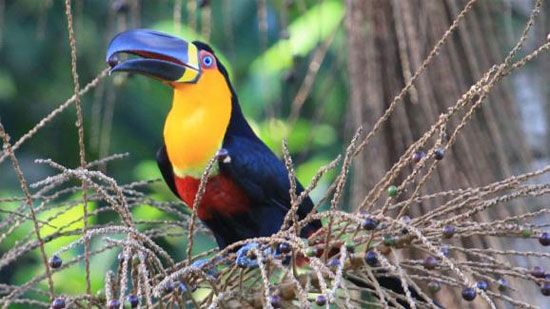Deforestation makes seeds difficult to regenerate
A study published in Science has shown that deforestation in Brazil is making plants produce smaller, weaker and less regenerating seeds.
The team believes that large birds, especially large ones can eat and spread seeds, leaving forests are the main cause of this situation.
Mr. Pedro Jordano of the Donana Biological Station in Seville (Spain), member of the research team, said: 'One of our big surprises is how to deforest can quickly affect the variable. loss of animals and plant growth in just a few generations. '

The research team believes that large birds, such as stretching and leaving the forest, are the main cause of shrinking plant seeds.
The Atlantic rainforest in Brazil used to be the home of many plants and animals. But the appearance of sugarcane and coffee plantations in the early nineteenth century made this place gradually devastated. So far, only 12% of the original forest remains.
To assess the impact of deforestation on the development of flora, scientists studied more than 9,000 seeds collected from palm trees in the forest.
It is observed that the seed from the heavily destroyed forest area is much smaller than the seed from the undisturbed forest area.
The team considered a number of factors that could lead to this situation, such as climate, soil fertility and forest cover. However, they found no evidence to prove these factors affected plant seeds, but realized that the main factor affecting the disappearance of large fruit birds.
Often birds like tufts, cotinga or use their large beak to eat fruit and spread seeds throughout the forest. But when the forest area is narrowed, these birds all fled, leaving only smaller birds such as thrush.
As a result, trees in the forest must adapt by creating smaller fruits suitable for small beaks so that the seeds are more easily dispersed.
'The problem is that the smaller the particle size, the less likely it is that the new plant will grow, because the small seed is very difficult to germinate, and it is easy to die when exposed to drought or to be attacked by fungi, especially in the context of climate change is expected to make rainforests dry, hotter and plant seeds less likely to survive, ' said Jordano.
He added that the team's findings will not only be limited to the Atlantic forest, but also to other parts of the world where rainforests, tapirs, monkeys and many birds and Other mammals are disappearing.
- Norway is officially the first country in the world to commit to deforestation
- New weapon to prevent deforestation
- How to choose melon seeds is not stained with chemicals
- The fruits with seeds are eaten by no one to notice
- Pumpkin seeds cure many diseases
- Excellent use of chia seeds for health
- Harm of sunflower seeds
- Detecting new cells can regenerate the liver
- 5 facts about little known wedge seeds
- How to choose sunflower seeds safely
- Scientists find a low-cost and effective solution to combat deforestation
- Nazca civilization destroys deforestation
 Why do potatoes have eyes?
Why do potatoes have eyes? 'Tragedy' the world's largest carnivorous life: Death becomes ... public toilet
'Tragedy' the world's largest carnivorous life: Death becomes ... public toilet Tomatoes were once considered 'poisonous' for 200 years
Tomatoes were once considered 'poisonous' for 200 years Detecting microscopic parasites on human face
Detecting microscopic parasites on human face